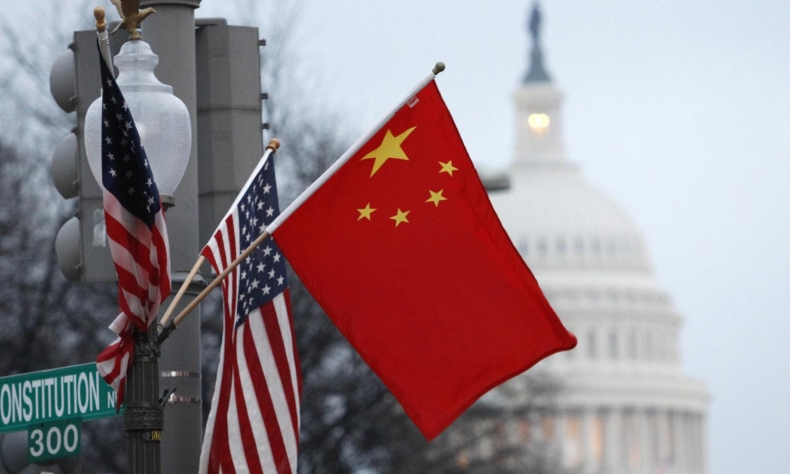Where Is the US Strategy Towards China Heading for?

Though competition is inevitable, deepening cooperation is the best way to develop China-US relations in the future. Both peoples should keep in mind that only the good China-US relations will benefit China, the US and naturally the whole world.
The China-US relations are now undergoing drastic changes. Recognizing these changes well is very important for us to better handle the bilateral relations. More importantly, we should get a clear understanding of the ever-changing US strategies towards China and the influence thereof, which I’d like to discuss from the following four viewpoints.
The vital change from rival to adversary
First, the rivalry between China and the United States has become increasingly fierce and the US has defined China as its adversary.
The National Security Strategy of the United States of America released on December 18, 2017, defined China as its arch-rival, followed by the issuance of the Nuclear Posture Review, Trump’s State of the Union Addresses for three years and the Strategic Path of the United States of America to the People’s Republic of China. The US has decided on such a strategic turn against China in 2017 and now has been decisively pushing the strategy further.
US strategic turn against China can be manifested in the following five respects:
On national level, the United States has been shifting from an open country and a trailblazer of economic globalization and trade facilitation and liberalization to a thorough advocate of unilateralism, protectionism, bullying and egoism, all pointing to neo-imperialism. The US has launched myriads of color revolutions, waged proxy warfare and manipulated anti-government forces. In the last two years, the US has been strongly interfering in China’s internal affairs and trying to split China, typically exemplified by its meddling in the affairs concerning China’s Hong Kong, Taiwan, Xinjiang and Tibet. How ridiculous it is that US Congress interferes in China by means of domestic legislation and jurisdiction.
As a profound strategic turn, the US has been more and more targeted at attacking and containing China. The 2017 National Security Strategy ranked China and Russia as its top rivals and the latest Strategic Path of the United States of America to the People’s Republic of China upgraded China from “rival” to “adversary”, showing the thorough strategic turn against China.
As for values, US politicians have become more hypocritical and double-standard. They abandoned globalism but are seeking US interests with ultra-unilateral means, namely, “America first”, and “making America great again”. They consider the maximization of American interests and the prioritization of politicians’ interests as their national values, which is selfish, short-sighted and outrageous. Previously, many countries and people regarded the US as the rules-maker of global liberalization, the paradise of freedom and the pinnacle of human development, highly upholding the American values. But now, the global impression of US values has plummeted.
On its economic layout, US President Trump proposed “independent manufacturing sector”. His economic advisor Larry Kudlow suggested incentivizing American enterprises to leave China for their own country. When China suffered the COVID-19 in early 2020, US Commerce Secretary Wilbur Ross gloated over the possibility that the outbreak would accelerate the re-shoring of the US manufacturing sector. The US has taken measures to cut off the industrial chain, supply chain, science and technology chain, service chain and innovation chain with China in an attempt to disintegrate the global industrial architecture and the inherent logic of value chain. The Trump administration has waged the war against China in areas of trade, science and technology and finance. The biliteral economic and trade relations, as the ballast stone and stabilizer of China-US relations in the past, have turned to be an arena of fierce competition.
There is also an about-face in the US public opinion. The Republican Party and the Democratic Party have reached a consensus on how to deal with China. Attacking China has become political correctness in the US, which is also supported by mainstream of public opinion. According to the public opinion poll released by Pew Research Center this May, up to 66 percent of Americans have a negative view of China, up over 20 percentage points than the previous year. It reflects that stigmatization of China by the US government and politicians has produced considerable impact on the general public. It is anticipated that US public opinion towards China may worsen.

Who is making troubles?
Second, the US has become the major trouble-maker in the US-China relations, world peace, international order and global economy.
As for China-US relations, China has been promoting cooperation with the US with its words and deeds. President Xi Jinping repeatedly pointed out that cooperation is the only correct option for China-US relations. During his meeting with Trump in Mar-a-Lago in the US in 2017, President Xi Jinping stressed that we had a multitude of reasons to sweeten rather than destroy China-US relations, showing China’s utter sincerity. China has been taking actions, including implementing the “100-day Plan” jointly proposed by China and the US and fulfilling its commitments under the phase-one trade deal between China and the US reached on January 15, 2020. But Washington has employed long-arm jurisdiction to restrict Chinese enterprises and even maneuvered with the Ottawa to detain Huawei’s Meng Wanzhou.
Nonetheless, the US side has been increasingly sabotaging China-US relations. The US government included 216 Chinese high-tech enterprises into the entity list in late 2019, and added 33 this year, including 13 Chinese institutions of higher education and a law case authentication center of the Ministry of Public Security. Such moves were not merely targeted at the Chinese enterprises, industrial chain, supplier chain and science and technology chain, but also interfered with highly competitive Chinese universities and cut off the connections between Chinese universities and American educational sector. Recently, the US planned to expel 3,000 to 5,000 Chinese graduate students mainly majoring in technology from its land.
The US has broken its promise of “one-China policy” by interfering with and making legislation on the Hong Kong, Taiwan, Xinjiang and Tibet issues.
The US is no longer supporter of globalism. It begins to go against globalization and has withdrawn from 13 international organizations and conventions, including World Health Organization. Among others, the US is cutting off economic ties with China. If the link is totally cut off, China and the US would sever relations with each other.
US should stop risky policy
Third, the overweening US seeking exclusive domination would be finally marginalized by the whole world.
The US should establish new values and stick to the moral line of humanity.
People’s lives are of paramount importance, which is clearly shown in the fight against COVID-19. The wide spread of coronavirus in the US virtually resulted from the supremacy of politicians’ interests and the administration’s ignorance of people’s lives. With less than 5 percent of the world’s population, the US has noticed a death toll of up to 30 percent of the global total. The US politicians blamed China, doubted China’s efforts and stigmatized China with various malicious tags.
However, the fact is that the Chinese government has placed top priority to the value of human life and insisted lives are above all. In sharp contrast, the US politicians have abandoned the value of human life and adhered to deviated governing ideas. The American death toll in the epidemic has exceeded that in the Vietnam War, the Iraq War, the American-Spanish War and even the First World War. Given such shocking death tolls during the coronavirus crisis, do the US leaders value human life? In late May, a white policeman kneed a black man on his neck to death, triggering nationwide protests and demonstrations. This could be seen as an outbreak of people’s anger for the ignorance to the value of life by the government, which was more vehement than the anger for the epidemic. Definitely, the anger also resulted from the huge deaths, unemployment and hopelessness for life.
The US should return to the path of maintaining world peace and promoting common development, instead of putting “America first”. It must reflect itself and appropriately handle the relations with other major powers and make sensible choices as a great power on the basis of mutual respect and trust. Its stubborn adherence to the law of the jungle and zero-sum game would ultimately lead to failure.
The US should come back to the track of international cooperation which is much-needed in economic and sci-tech spheres as well as in the fight against the virus. Many Chinese thought that the fight against COVID-19 could offer an opportunity for China-US cooperation. Unexpectedly, it turned to be a chance for the US to leverage to attack and blame China. But these anti-China acts by some US politicians won’t benefit the US either.
How should China handle the relationship with the US?
My fourth viewpoint is that China should keep a sober mind and retain its composure in the competition imposed by the US and in the evolution of global economic and political structure.
China should know both itself and the US to avoid strategic misjudgment. We should keep in mind the two facts: the US is now powerful and its China policy is moving further on the wrong way. So, China should look at itself objectively and have a good understanding of what the country should do. China will continue to focus on its own development. Especially, this year is great significance for China to eliminate absolute poverty in the country and build a moderately prosperous society in all respects.
As the second largest economy in the world, China finds it hard to keep low-profile. But China needs to take a practical approach to do its work. Chinese leadership has stressed at a number of important meetings that China should adhere to its own way and push all work forward solidly while opposing any expansionism.
Besides, China should keep alert against domestic ideological surge, like leftism, extreme populism and other harmful ideological trends, which would bring disastrous ideological confusion to people.
Though competition is inevitable, in my opinion, deepening cooperation is the best way to develop China-US relations in the future. The two countries should respect each other and establish a constructive partnership for the next half century. The two sides should assume shared responsibilities for the world and mankind. All in all, both peoples should keep in mind that only the good China-US relations will benefit China, the US and naturally the whole world.
The author is member of the academic board of the Center for China and Globalization (CCG) and the chief economist at the China Center for International Economic Exchanges (CCIEE).
 Facebook
Facebook
 Twitter
Twitter
 Linkedin
Linkedin
 Google +
Google +










